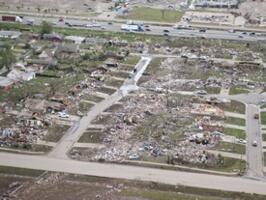Oklahoma! A Commentary By Froma Harrop
A Commentary by Froma Harrop
The world looked upon the tornado-flattened landscape of Moore, Okla., with awe. The destruction was shocking, as were the personal losses. Many Americans in the audience also felt -- and this must be said -- some comfort. Here was a country of strong people rolling with some very serious punches. It still exists.
On CNN, BBC or wherever, one heard plainspoken voices describing their ordeal with natural stoicism. These were victims (a word they might not apply to themselves) standing in front of the trash piles that were their houses. Some were bearing the death of loved ones, including nine schoolchildren. They spoke calmly of what happened and what they must do next.
In the world of TV coverage, miles of devastated streetscapes make for arresting visuals. For this viewer, seeing Oklahomans discuss the monstrous funnel's rampage in a straightforward manner, only choking up at the end, was far more moving than a sensational telling drenched in passion.
But did that fit into the prewritten script that TV news follows in a disaster?
The camera does not love quiet forbearance. The script calls for wailing victims. And there must be heroes.
In this calamity, there was no shortage of brave people, putting themselves in danger to save others. Reporters found them easily and asked the stock question: "Do you consider yourself a hero?"
It's rare that anyone will come out and say, "Yes, I'm a hero." But there are ways to imply it. You often hear, sometimes with false modesty, "Anyone would have done what I did." Television likes that. But when the Oklahomans were asked whether they considered themselves heroes, they were more likely to brush off the question or answer in a flat "nope."
We glued to screens vividly recall the memorable moments when CNN's Wolf Blitzer prompted a young mother to describe her close escape. Standing beside the exposed carpet of her wrecked house, Rebecca Vitsmun related in a matter-of-fact way how, when she saw the tornado heading her way, she grabbed her baby and made a run for it.
Vitsmun smiled through the entire interview, and so did the toddler. No tears. No moaning about how everything her family owned is lost. No mention of irreplaceable heirlooms smashed to bits. Hers was a harrowing story delivered matter-of-factly.
Almost in a fit of frustration for drama, Blitzer gives the woman her cue. "You've gotta thank the Lord, right? Do you thank the Lord for that split-second decision?" The script says that people in the heartland are prone to publicly thank the Lord with great emotion.
Showing considerable patience, the woman answers, "I -- I'm actually an atheist."
Taken aback, Blitzer says: "Oh, you are? All right."
Vitsmun then responds with perfect grace, "We are here, and I don't blame anybody for thanking the Lord."
Tornado alley is a special kind of danger zone. When flooding is expected, people can move to high ground. There is no obvious place to flee in Tornado Alley. When the warning comes, it's often just a few minutes' worth. And any structure could be a bowling pin about to be knocked down.
A tornado is terrifying to look at, its freight-train roar horrifying. Coastal Americans visiting Kansas City take special notice of the "tornado shelter" signs in tall buildings. "We know we live in Tornado Alley," many interviewees said with resignation. And they're staying in Tornado Alley.
Most of the world has never been to Oklahoma. What it knows about Oklahoma may have come from the musical "Oklahoma!"
Note the exclamation point in the title. People in Oklahoma don't talk in exclamation marks, and that's all the more reason to keep it.
Rasmussen Reports is a media company specializing in the collection, publication and distribution of public opinion information.
We conduct public opinion polls on a variety of topics to inform our audience on events in the news and other topics of interest. To ensure editorial control and independence, we pay for the polls ourselves and generate revenue through the sale of subscriptions, sponsorships, and advertising. Nightly polling on politics, business and lifestyle topics provides the content to update the Rasmussen Reports web site many times each day. If it's in the news, it's in our polls. Additionally, the data drives a daily update newsletter and various media outlets across the country.
Some information, including the Rasmussen Reports daily Presidential Tracking Poll and commentaries are available for free to the general public. Subscriptions are available for $4.95 a month or 34.95 a year that provide subscribers with exclusive access to more than 20 stories per week on upcoming elections, consumer confidence, and issues that affect us all. For those who are really into the numbers, Platinum Members can review demographic crosstabs and a full history of our data.
To learn more about our methodology, click here.

